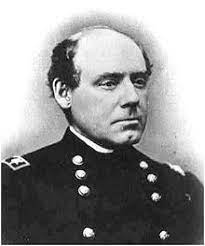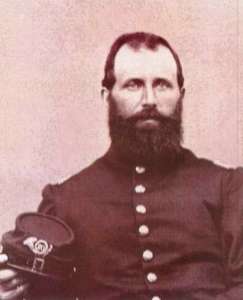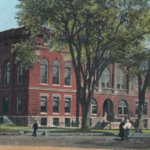Up and down the Kennebec Valley: Holidays: Memorial Day
by Mary Grow
GAR posts Augusta, North Vassalboro and Clinton
Waterville’s W. S Heath GAR (Grand Army of the Republic) Post #14, described last week, was the second founded of the eight in the part of Kennebec County covered in this series, according to Henry Kingsbury’s county history. It was the third of 19 in the whole county, Kingsbury wrote.
Kingsbury’s list begins with a post in Gardiner, followed by Augusta’s Seth Williams Post #13, organized July 25, 1872. Then came Waterville’s, organized Dec. 29, 1874.
Kingsbury then listed:
- Richard W. Mullen Post #33, North Vassalboro, no date given;
- Billings Post #88, Clinton, organized Oct. 9, 1883;
- James P. Jones Post #106, South China, organized April 23, 1884;
- Vining Post #107, Windsor, organized June 2, 1884;
- Amos J. Billings Post #112, China Village, chartered June 17, 1884;
- Joseph W. Lincoln Post #113, Sidney, mustered May 24, 1884.
* * * * * *
Brevet Major General Seth Williams (March 22, 1822 – March 23, 1866), for whom the Augusta GAR Post was named, was an Augusta native, Kingsbury wrote. James North, in his Augusta history, said his parents were Daniel and Mary (Sawtelle) Williams; Mary was from Norridgewock. Daniel and his brother Reuel were prominent in Augusta business and politics.
Seth Williams graduated from West Point July 1, 1842, and served in the United States First Artillery (Kingsbury; North says it was the Second Artillery), either entering as a brevet second lieutenant (North) or attaining the rank in 1844 (Kingsbury).
(The word “brevet” means someone promoted to a higher rank, especially as a reward for outstanding service, without the higher pay that normally accompanied the new rank.)
An on-line article by Charles Francis added that among Williams’ “minor” posts in his first three years in the military was Hancock Barracks, in Houlton, Maine.
Williams was promoted to first lieutenant in 1847, during the Mexican War (April 25, 1846 – Feb. 2, 1848). North wrote that he was in battle at Palo Alto (May 8, 1846) and Resaca de la Palma (May 9, 1846), and during the latter “his gallant bearing attracted the notice of a distinguished general officer, who invited him to become a member of his military family.”
(The officer was General Robert Patterson [Jan. 12, 1792 – Aug. 7, 1881], an Irish-born Pennsylvanian, veteran of the War of 1812. He was wounded at the April 18, 1847, Battle of Sierra Gordo, not seriously enough to keep him from becoming a successful businessman and serving in the Civil War.)
When Williams visited Augusta in July 1847, North said, Colonel James L. Child hosted a party at the Arsenal and townspeople gave Williams an inscribed sword.
Kingsbury wrote that Williams was brevetted captain the day of the Battle of Sierra Gordo in recognition of his “gallant and meritorious conduct.”
After the Mexican War ended, Williams served in other minor posts until he became adjutant at West Point from September 1850 to August 1853. Francis wrote that he “was held in the highest esteem, and was remembered with affection” by the cadets he supervised.
Next he became a captain and assistant adjutant general in Washington, where he remained until the Civil War began in April 1861.
Williams served in both staff and battlefield positions. Kingsbury’s account of his service includes membership on General George McLellan’s staff in the early days; becoming a major in August 1861; and later that year becoming “adjutant general of the Army of the Potomac” and “brigadier general of volunteers.”
Although these were challenging jobs, North and Kingsbury wrote that Williams’ performance was approved by the various commanders he supervised. Francis wrote that Williams was made a brevet colonel for his gallantry in the July 1, 1863, Battle of Gettysburg.
In November 1864 (North) or on Jan. 12, 1865 (Kingsbury), failing health led to his reassignment as Inspector General on General Ulysses Grant’s staff. In this position he inspected parts of the army in Virginia before taking part in the final Civil War campaign and the negotiations for General Robert E. Lee’s surrender at Appomattox, Virginia, in April 1865.
Williams remained in the army after the war ended, serving on General George Meade’s staff. Kingsbury said his final “special service” was as a member of a January 1866 commission that investigated charges brought by the government of Prussia about “the enlistment of some of its subjects into our army.”
Sources differ on how Williams became a brevet general. Kingsbury and North imply he was promoted before his death in March 1866; they wrote he became a major general as of August 1864 (North) or effective March 13, 1865 (Kingsbury). Wikipedia says President Andrew Johnson nominated him to the two ranks on April 10 and July 17, 1866, with both appointments retroactive to March 13, 1865.
Kingsbury praised Williams as a man who did his duty even if he thereby hurt others, but was in private “one of the most lovable of men.” Kingsbury’s adjectives for him included courteous, tactful, beloved, admired and respected. North concurred. He called Williams “modest” and “unassuming,” with “sterling qualities of mind and heart that won the respect and confidence of acquaintances and associates.”
When General Grant heard that Williams had died in Boston, Massachusetts, he telegraphed sympathy to Williams’ father and asked that the body be buried at West Point. The family chose Forest Grove Cemetery, in Augusta.
Williams’ body came to Augusta “by special train,” North wrote. There was a service at St. Mark’s Church and another at the graveside, but at the family’s request, the only military ceremony was a 15-gun salute at the Arsenal.
Afterwards, North wrote, Williams’ father commissioned a memorial stained-glass window in St. Mark’s Church.
Francis mentioned one more memorial to Seth Williams: Fort Williams in Cape Elizabeth, named on April 13, 1899, honored the Augusta soldier. The fort was active through the two world wars and beyond; it was closed on June 30, 1962, Wikipedia says, and since July 1979 has been Fort Williams Park.
* * * * * *
Richard W. Mullen Post #33, in Vassalboro, honors the man identified in Alma Pierce Robbins’ Vassalboro bicentennial history as one of the first officers in the 14th Maine regiment when it assembled in Augusta in 1861.
From its position on Kingsbury’s list, the Post must date from mid-January, 1881. Kingsbury said it had 18 charter members and by 1892, 42 members.
Kingsbury located Post #33 in North Vassalboro, but he was probably in error. The Vassalboro Historical Society owns a black and silver DAR ribbon with the Post’s name and number that plainly says “East Vassalboro, ME.”
Writing in 1971, Robbins said, “All older citizens will recall that the Richard W. Mullen Chapter, G.A.R., was active in Vassalboro for many years until they turned their records over to the American Legion Post #126 (1942).”
Over those years, she reported, the town donated to the Women’s (or Woman’s) Relief Corps (the GAR’s ladies’ auxiliary) to decorate veterans’ graves and hold Memorial Day services. The Legion and Auxiliary took over those responsibilities.
Capt. Richard Wright Mullen, son of Richard Mullen, was born April 19, 1831, in Amesbury, Massachusetts, and died May 14, 1875, in New Orleans, Louisiana, according to the Find a Grave website.
The Maine Adjutant General’s Report for the year ending Dec. 31, 1861, lists Richard W. Mullen, of Vassalboro, as the captain of company B, 14th regiment. When the report was compiled, the 14th was in camp at Augusta.
(The regimental commander was Colonel Frank S. Nickerson. Col. Nickerson, born in Swanville, Maine, became a brigadier general and survived the war, dying in Boston in 1917.)
Wikipedia says the 14th Maine was mustered into active service Dec. 31, 1861, and mustered out Jan. 3, 1865. Attached to General Benjamin Butler’s New Orleans expedition, the men took ship from Boston Feb. 6, 1862; they were in Mississippi from early March to mid-May, got to Louisiana early in July and fought in the Aug. 5, 1862, Battle of Baton Rouge.
Mullen is buried in the North Vassalboro cemetery. On his gravestone above his name is the Latin phrase “In hoc signo vinces,” commonly translated as “In this sign, thou shalt conquer” and a cross.
A long inscription says he was “severely wounded” at the Battle of Baton Rouge. Despite only partially recovering, he was “called into public service” and when he died was collector of customs in Franklin, Louisiana, a town west of New Orleans.
(State records say 86 members of the 14th Maine were killed or died from their wounds, and 332 died of disease.)
* * * * * *
Billings Post #88, organized in Clinton on Oct. 9, 1883, had 19 charter members and 23 members in 1892, Kingsbury wrote. Meetings were held in Centennial Hall.
The Post honors Clinton native Captain Charles Wheeler Billings (Dec. 13, 1824 – July 15, 1863), son of Abijah (or Abaijah) Munroe Billings (1797-September 1881) and Rhonda (or Rhoda) (Warner) Billings (1798-1836).
An on-line article by Paul Russinoff, a Marylander who collects Civil War photographs, says that Abijah Billings ran a wool carding mill and was postmaster in Clinton. He sent his son to a private school; when Charles was 22, he bought a half-interest in his father’s mill.
In 1849, Charles Billings married Ellen Libby Hunter (July 1, 1833 – 1924), daughter of a prominent local family whose patriarch was in the lumber business. They had three daughters, Isadore Margaret (Billings) Timberlake (1850 – 1897), Alice Warner Billings (1856-1860) and Elizabeth W. “Lizzie” Billings (1860 – Dec. 7, 1863).
By the outbreak of the Civil War, Billings was an established businessman and active in town affairs, holding office as a selectman and as town clerk. He did not volunteer for military service in the excitement of 1861, but did on Aug. 9, 1862.
Russinoff quotes from a letter to his father suggesting his motivation: he saw the war as a choice between protecting liberty and “let[ting] the sword of despotism and ignorance sweep over our fair country.”
In the fall of 1862, as a second lieutenant in Company A of the 20th Maine, Billings started keeping a diary, which Russinoff said ended in April 1863. Also that month, he returned to Clinton for the last time on a 15-day-furlough.
Meanwhile, on Feb. 7, 1863, Russinoff wrote, he had been transferred to Company C and promoted to captain.
Billings was wounded in the left knee at the Battle of Little Round Top on July 2, 1863. His wife got word, and with his younger brother, John Patten Billings, came to Gettysburg; they arrived on July 15, a few hours after Billings died in the Fifth Corps field hospital at Gettysburg.
The 20th Maine monument at Gettysburg lists him as the highest-ranking officer in the regiment to die as a result of the battle.
Ellen had his body brought back to Clinton. She did not remarry; Russinoff found that she later lived with daughter Isadore, in Lancaster, New Hampshire.
Where she was between Isadore’s death and her own, Russinoff did not say. Ellen is buried with Charles, their daughters and his parents in Clinton’s Riverview Cemetery.
On the Men of Maine Killed in the Victory of Baton Rouge, Louisiana
(A poem by Herman Melville, 1866)
Afar they fell. It was the zone
Of fig and orange, cane and lime
(A land how all unlike their own,
With the cold pine-grove overgrown),
But still their Country’s clime.
And there in youth they died for her –
The Volunteers,
For her went up their dying prayers:
So vast the Nation, yet so strong the tie.
What doubt shall come, then, to deter
The Republic’s earnest faith and courage high.
Main sources
Kingsbury, Henry D., ed., Illustrated History of Kennebec County Maine 1625-1892 (1892).
North, James W., The History of Augusta (1870).
Robbins, Alma Pierce, History of Vassalborough Maine 1771 1971 n.d. (1971)
Websites, miscellaneous
Responsible journalism is hard work!
It is also expensive!
If you enjoy reading The Town Line and the good news we bring you each week, would you consider a donation to help us continue the work we’re doing?
The Town Line is a 501(c)(3) nonprofit private foundation, and all donations are tax deductible under the Internal Revenue Service code.
To help, please visit our online donation page or mail a check payable to The Town Line, PO Box 89, South China, ME 04358. Your contribution is appreciated!







Leave a Reply
Want to join the discussion?Feel free to contribute!